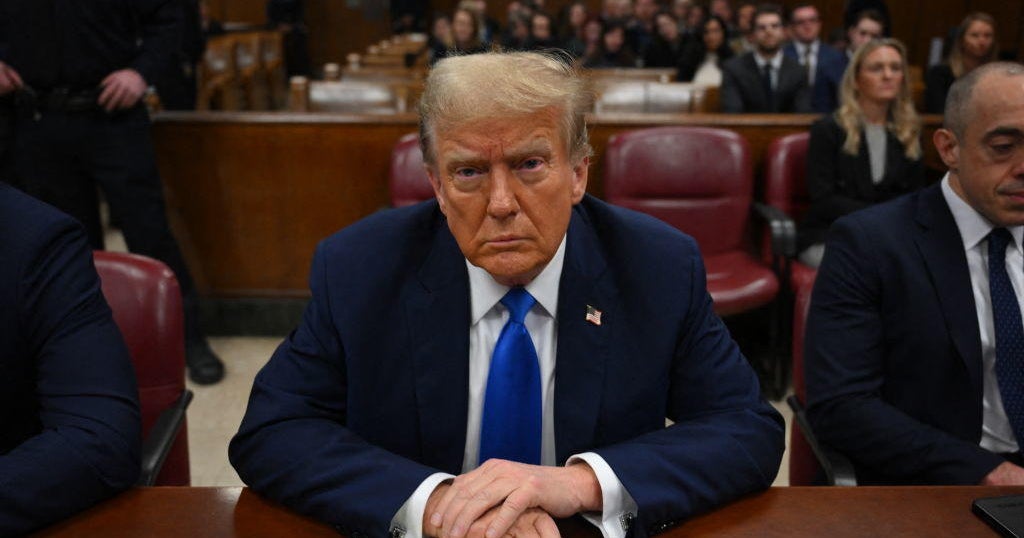Opening statements in former President Donald Trump's criminal trial in New York are underway, as prosecutors and the defense get underway. Laying out their case For Judges in Historical Proceedings.
Trump has been accused of falsifying business records to hide “hush money” payments during his 2016 campaign. Defense attorneys are expected to argue that Trump was impeached on flimsy testimony from an unreliable key witness.
In court, Trump said the investigation was “election interference” and part of an effort to keep him off the campaign trail. He called the case a “witch hunt” and a “disgrace”.
Prosecutors from Manhattan District Attorney Alvin Bragg's office were given 40 minutes to present their opening statements, and Trump's lawyers 25 minutes. Because New York law does not allow recording of criminal proceedings, the proceedings were not televised. CBS News reporters were watching the trial in the courtroom and in a nearby overflow room.
Prosecutors' opening statement
Angela Weiss/Pool/AFP via Getty Images
Matthew Colangelo, a member of the Bragg team, made the central allegations in the case and opened the case for prosecution. It's Trump will be imposed with 34 offences Pleaded not guilty to falsifying business records.
Days before the 2016 election, Trump's lawyer at the time, Michael Cohen, paid $130,000 to adult film star Stormy Daniels She kept quiet about an alleged sexual encounter with Trump several years ago. Trump denies the meeting.
Cohen “made the payment at the defendant's direction and did so to influence the election,” Colangelo said. He was paid as part of a plan by Trump, Cohen and David Becker, CEO of the National Enquirer's parent company, to bury negative stories about Trump and attack his rivals. Colangelo said the plan was hatched in a 2015 meeting at Trump Tower.
“The two of them conspired together to influence the 2016 presidential election,” Colangelo told the jury, adding that Becker agreed to act as Trump's “eyes and ears” during the 2016 campaign. Becker is expected to be the first witness called by the prosecution after opening statements.
Colangelo devised a “catch and kill” tactic allegedly used by Becker and Dylan Howard, the editor of the Enquirer, to protect Trump from negative stories. The practice involves buying the rights to one's story, refusing to publish the account, and hiding it. They used the Enquirer to spread misinformation about Trump's rivals.
Before paying Daniels, the Enquirer's parent company, AMI, Inc. Prosecutors allege he used a “catch-and-kill” tactic twice. An example is paying a former Playboy model $150,000 for the rights to her story. Model Karen McDougall has also been accused of having an affair with Trump, which she denies. Colangelo told jurors he heard Cohen promise to set up a shell company to buy the rights to McDougal's story.
In the weeks leading up to the 2016 election, Daniels' lawyer approached the Enquirer about selling the rights to his story as well, Colangelo said. According to prosecutors, Howard contacted the attorney with Cohen, who negotiated a $130,000 payment. Colangelo said Trump hoped to delay the deal until after the election and then never pay. Cohen eventually transferred the money to Daniels' attorney a few days before Election Day.
“This was a planned, coordinated, long-term conspiracy to influence the 2016 election to help Donald Trump get elected,” Colangelo told the jury. “This is election fraud, pure and simple.”
Trump reimbursed Cohen for payments in 12 monthly installments during the first year of his presidency, portraying the legal services as checks in an illegal scheme, according to prosecutors. Cohen ultimately received $420,000 — more than double the $130,000 he paid Daniels.
“Donald Trump was a very frugal businessman. He believed in pinching pennies. He believed in watching every dollar. He believed in haggling over every bill. Trump ran the system in total control. You'll hear testimony of his unrelenting focus on the bottom line. With Cohen and the 'catch and kill' deal, he priced “He didn't cut it, he doubled it,” Colangelo said. “You will ask for proof that the Trump organization is not in the practice of paying twice what they should be paying for anything.”
